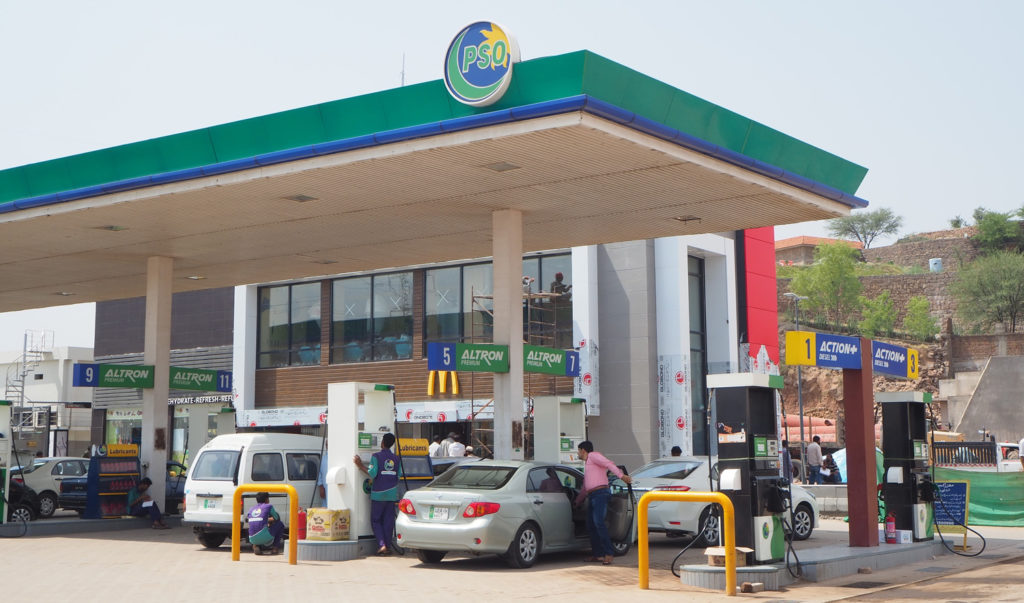
KARACHI: Pakistan’s Oil Marketing Companies (OMCs) sales during the year ended June 30, 2020 witnessed a downfall of 11 percent to 16.41 million tons with the major contributor being Furnace oil (FO) which goes down by 36 percent in FY20, numbers revealed by Oil Companies Advisory Committee (OCAC) suggest.
However, a total of 1.62 million tons of petroleum products were sold in June 2020, marking the strongest sales for FY20.
“The slump in OMCs sales during the year can be attributed to the COVID-19 pandemic initiated after 2QFY20 which slacken the demand of oil led by economic slowdown, shutdown of manufacturing plants, and temporary ban on transport and import-export related activities,” Muhamad Abdul Rafay at Pearl Securities said.
On a monthly basis, OMCs sales increased by 9.0 percent in June 2020 to clock in at 1.6 million tons as compared to 1.4 million tons in May 2020. The surge in sales is primarily driven by decrease in petroleum prices, resumption of operational and trading activities, and ease in lock-down phase.
Major contributor towards the segment was Motor Spirit (MS) which increased by 14 percent to clock in at 725k tons in June 2020.
Pakistan State Oil (PSO) volumes witnessed sequential growth of 35 percent in June clocking in at 842,000 tons with FO and MS being the key contributors surging 146 percent and 44 percent. PSO’s volumes surged 31percent in June 2020 as compared with June 2019.
As PSO is the major petroleum product supplier of the country, the increase in volumes is primarily driven by higher demand and lower petroleum prices during the month of ease. However, during FY20, sales volumes witnessed a decrease of 7 percent to stand at 7.2 million tons. “This can be attributed to 46 percent decrease in FO volumes, , where MS and HSD volumes covered this loss surging 5 percent and 6 percent in FY20.
Attock Petroleum Limited (APL) posted a decline of 12 percent in volumes to 1.6 million tons during FY20. High-Speed Diesel (HSD), down 18 percent to 625,000 tons, is the major contributor in decreasing volumes for APL. On a sequential basis, APL recorded a 12 percent rise in volumes in June 2020 to stand at 155,000 tons as compared to 138,000 tons in May 2020. Furnace Oil (FO) led the chart with 58 percent higher sales volumes in June due to resumed economic activities.
Hascol Petroleum Limited (HASCOL) observed a 44 percent decrease in volumes to 1.0 million tons during FY20 as compared to 1.9 million tons in previous year. The major contributors for HASCOL are FO and HSD which declined 84 percent and 44 percent. On sequential basis, HASCOL’s volumes shrank 40 percent to 70,000 tons in June due to low demand scenario.
Shell Pakistan Limited (SHEL) volumes declined 14 percent to clock in at 1.3 million tons in FY20 as against 1.5 million tons in the previous year. FO emerged as a disappointment for SHELL, having sales down by 70 percent. On a monthly basis, Shell recorded a slight increase of 9 percent to clock in at 108,000 tons as compared to 99,000 tons in May 2020.
As the nation starts to get somewhat accustomed to the new normal of living with a pandemic and industries start to open up, analysts expect oil demand in Pakistan to continue its recovery.
“While HSD could see a sharp recovery given its low base, the growth in MS is expected to be relatively smoother. Furthermore, with the ban on import of FOl now officially lifted to meet peak power demand, we expect its share in the sales mix to rise. Nonetheless, we would flag that deterioration in the Covid-19 situation could potentially result in strict enforcement of lockdowns which could temporarily hamper sales of retail fuels,” Ali Zaidi noted in a report issued by JS Global.